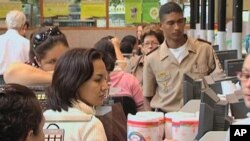Combating malnutrition and making food more affordable are pillars of Venezuelan President Hugo Chavez' socialist program. Food prices have soared, however, amid shortages of basic staples, forcing supermarkets to ration goods.
Economists blame price controls and expropriations for plummeting food production, which has led Venezuela to import vast quantities of grains and meat. The government accuses private companies, though, of hoarding food to inflate prices in pursuit of fatter profits.
No one is starving in Venezuela, but signs limiting purchases of flour, margarine and other staples adorn supermarket shelves, leaving shoppers like Adela Franco frustrated, who said, "You can never find what you need unless you go to several stores."
Another shopper agrees. "One day there is chicken, but no beef, so you have to buy chicken. And you find that everything costs a little more than the week before."
The situation is easy to explain, says economist Orlando Ochoa. "President Chavez's price controls on food, combined with inflation, have seriously distorted agricultural prices and costs, and led farmers to cease production of grains, meat and milk. The end result: Venezuela has been forced to import on a massive scale everything it used to produce domestically."
Mr. Chavez insists his policies are not at fault. "The revolution will continue to produce, like a machine, guaranteeing ample and affordable food for all Venezuelans."
Chavez says scheming capitalists are to blame for food supply disruptions. "They cut production and sometimes allowed milk to go bad. Why? To raise prices. They played a dirty game to manipulate the market. But we terminated their game. The revolutionary government nationalized them and assumed responsibility for dairy production."
To aid the poor, the government has set up a network of state-operated grocery stores, selling goods from nationalized industries at discounted prices. Shoppers like Laura Hernandez go to buy whatever is in stock.
"This store is vital," said Hernadez. "You can save a lot of money here. The only problem is that sometimes you cannot find what you need. Much is lacking: sugar, milk, basic items."
The government-run stores are shunned by well-to-do Venezuelans like Adela Franco. "I do not trust what they sell there. I do not know if the food is fresh or of good quality."
But the march towards a socialist food supply continues. The latest government target for nationalization is Empresas Polar. The mega-conglomerate produces everything from beverages to the number-one brand of flour used to make arepas - pita-like sandwiches that are the mainstay of the Venezuelan diet.
President Chavez recently lashed out at Polar on national television. "If Polar continues to hoard products, we will have to go after it. We will not allow anyone to swindle us."
Polar executives deny any wrongdoing, saying their production is limited by the dwindling availability of raw foodstuffs in Venezuela.
Meanwhile, shoppers continue to patronize privately-owned supermarkets that may or may not exist in the future.













